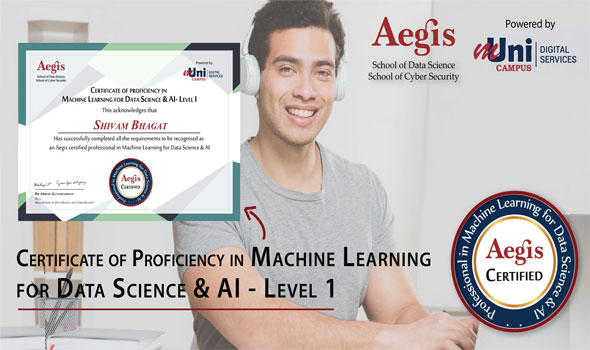
Aegis School of Data Science & AI
| Application fee: | 1500 * INR |
| GST: | 18 % |
Certificate of Proficiency in Machine Learning for Data Science & AI

Details
| Certification Body: | Aegis School of Data Science |
|---|---|
| Location: | Online |
| GST: | 18% |
| Total course fee: | 0 * INR |
| Rating: |
Course Details
Certification Exam Description
This certification is designed to meet a growing business need of individuals skilled in Artificial Intelligence, Data Analytics and Data Science as Machine Learning is the backbone of these fields. This certification will combine theory and practice to enable everyone to gain the necessary knowledge to compete in the ever changing work environment. This certification will be based on Basics of Machine Learning, Linear Models for regression and classification, Non-Linear Models for regression and classification, Dimensionality Reduction Techniques and Clustering Techniques (Topic are provided below).
The exam is closed book and no outside reference materials are allowed. The exam’s duration is 120 minutes, and it comprises 120 questions. The following topics are general guidelines for the content likely to be included in the exam. However, other related topics may also appear on any specific delivery of the exam. If any changes required in the following guidelines, sufficient time will be provided to the candidates to prepare accordingly.this cannot happen randomly, at any time, changes should be made only at pre-specified intervals, and sufficient time will have to be given to the candidates to prepare accordingly.
Brief about Topic:
Machine learning is a subfield of artificial intelligence that is concerned with the design, analysis, implementation, and applications of programs that learn from experience. It offers some of the most cost-effective approaches to automated knowledge acquisition in emerging data-rich disciplines (bioinformatics, cheminformatics, neuroinformatics, environmental informatics, social informatics, business informatics, security informatics, materials informatics, education etc.). Learning algorithms can also be used to model aspects of human and animal learning.This certification will test your subject knowledge. Also, this will test your communication skills to convince your findings / results to your clients.
Certification Exam Topics
|
Sl. No. |
Topic/Subtopics |
|
1. |
Introduction
|
|
2. |
Exploratory Data Analysis and Data Preprocessing
|
|
3. |
Resampling Techniques and Model Tuning
|
|
4. |
Linear Regression Analysis
|
|
5. |
Regularization Techniques
|
|
6. |
Logistic Regression and Evaluation Metrics for Classification
|
|
7. |
Imbalance Class Classification problems
|
|
8. |
K-Nearest Neighbors
|
|
9. |
Dimensionality Reduction Techniques
|
|
10. |
Clustering Techniques
|
|
11. |
Naïve Bayes Classifiers Classification using Naïve Bayes family of Classifiers |
|
12. |
Support Vector Machines
|
|
13. |
Decision Trees
|
|
14. |
Ensemble Techniques
|
|
15. |
Recommender Systems
|
|
16 |
Artificial Neural Networks |